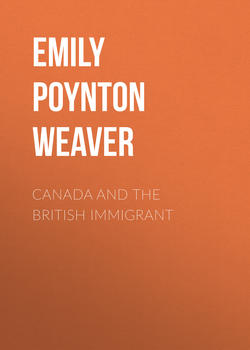Читать книгу Canada and the British immigrant - Emily Poynton Weaver - Страница 2
PREFATORY NOTE
ОглавлениеBy the very writing of this book, I am in a measure offering myself as a guide to any prospective immigrant choosing to avail himself of my services. It is well, therefore, to explain that I myself came out from England, a good many years ago, as one of a large family, to settle in Canada, and so know something at first hand, of the difficulties, the trials and the pleasures that await the newcomer in the attempt to “make good” under unfamiliar circumstances.
My father had had no previous experience of farming, but fortunately one of my brothers had had a little training on a Cheshire farm. We settled ourselves on a good-sized farm in a fertile district of Ontario, and there we had an experience probably broadly resembling that of many new arrivals—sometimes amusing, sometimes vexatious, or worse. Of course we made some mistakes and had to pay for them; and we took, I am inclined to think, several years really to settle down. But in the end we all “believe in Canada,” though I dare not say we believe in everything we read about Canada.
After a number of years on the farm, there followed for some of us years in Toronto and in Halifax, Nova Scotia. I may claim, moreover, to know something, still at first hand, of many parts and of all the provinces of the Dominion (save one), while it has been my lot to give for many years much time to the study of Canadian history.
The purpose of this book is, however, neither to set forth the history of the Dominion, nor to relate our own individual experiences, whilst we were “feeling our way,” as a neighbour once expressed it. It is intended rather to give a general idea of the Dominion as a whole, and of each of the provinces a little more in detail, touching their history only as it seems likely to help to the understanding of what they now are, and of the attitude and ideals of the Canadian people.
I have written much of resources and opportunities, but have endeavoured also not to neglect mention of disadvantages, for Canada is no “earthly paradise,” but only “a good land and a large,” where there is scope for many types of human beings to develop physically, mentally and spiritually, as some of them have not room to do in the crowded centres of population in the Old World.
I should like to add that my thought always in every chapter has been of the British immigrant, present or to come; and this must be my excuse for dealing with such a familiar subject as Canada in a way that may seem to those who dwell therein to be marked both by sins of omission and of superfluity.
I have endeavoured to draw my facts and figures from reliable sources only. I have obtained them largely from government reports; but desire to acknowledge my indebtedness also to Mr. Frank Yeigh’s valuable statistical compilation, “Five Thousand Facts about Canada,” and to some of the special numbers of the Globe (Toronto) which, from time to time, publishes comprehensive reviews of conditions in the different provinces.
The black-and-white illustrations, supplementing Mr. Copping’s beautiful sketches in colour, are from photographs gathered from various sources. Not a few of them, however, I owe to the courtesy of the Department of the Interior, Ottawa, the Canadian Pacific, the Canadian Northern, and the Grand Trunk Railway Companies.
Before the reader passes on to the book itself, I should like to add a word of warning. In the short interval between the writing of these pages and the revising of the proofs, conditions in Canada with regard to the demand for certain classes of labour have changed owing to the financial stringency of 1913. I believe the set-back is only temporary, and there is little probability of any decrease in the demand for men to work on the farms, for the prices of all agricultural products are high enough to warrant, if it were possible, a very largely increased output. Moreover, the harvest of the year just passed was extraordinarily bountiful and encouraging for the future.
But, for the next few months at least, persons who propose to seek work in the towns, at building and other constructive trades, or in shops or offices, would be wise to make very sure of employment in Canada, before giving up work at home. The cost of living (including house-rent, fuel, and food) is very high here; and the immigrant who arrives in slack times may have a long season of waiting for work. But he who comes out when work is plentiful is in an entirely different position, as he should be able to lay by something for a time of less general prosperity.
I would say to all prospective immigrants—make very particular inquiries as to conditions in the special line of work you intend to follow before leaving home, as this may save much disappointment and even hardship.
In the appendix are addresses of persons from whom further information may be obtained, notes on the government land regulations, and so forth, which it is hoped may prove of practical use to immigrants.
E. P. W.
Toronto, Ontario.
January, 1914.
